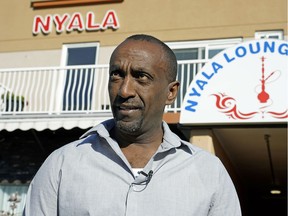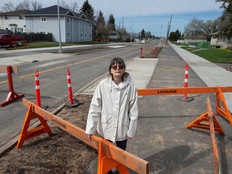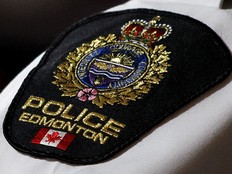Law enforcement board dismisses appeals from Edmonton hookah lounge owner who sparred with police
The lounge was licensed and allowed patrons to smoke hookah, a waterpipe used to consume shisha, a flavoured tobacco

Article content
A pair of complaints from the owner of a defunct Edmonton lounge who claims he and other African businesses were the target of “overzealous” policing have been dismissed.
The Alberta Law Enforcement Review Board (LERB) dismissed the appeals from Mulugeta (Moe) Tesfay last month, finding Edmonton Police Service Chief Dale McFee made no legal errors in his earlier decisions to toss the complaints.
Tesfay owned and operated Nyala Lounge, 10875 98 St., a hookah bar and restaurant that came to the attention of the EPS hospitality policing unit and the city’s public safety compliance team.
In an interview Tuesday, Tesfay said he was disappointed with the LERB’s decision to uphold the chief’s dismissals.
“They completely destroyed my name and the business, and I never tried to reopen,” he said of the police and city.
Tesfay, who comes from Ethiopia, opened Nyala in 2011 after a stint in the Canadian Armed Forces. The lounge was licensed and allowed patrons to smoke hookah, a waterpipe used to consume shisha, a flavoured tobacco.
The business eventually attracted the attention of police and city officials. Tesfay said there were frequently “more cops than customers” at the lounge, something he claimed other African businesses sometimes encountered. He claimed the attention was discriminatory and that other bars that had problems with fighting did not have a similar police presence.
Beginning in 2017, Tesfay filed a series of complaints against the police service, claiming the hospitality policing unit and public safety compliance team “wrongfully targeted (his) restaurant and other businesses catering to the African Canadian community with overzealous policing activity,” the LERB summarized.
Tesfay was arrested that year for allegedly selling unlicensed tobacco — charges that were later stayed.
The city revoked Nyala’s business licence in fall 2018 after a request from the public safety compliance team. A city official claimed in a news conference there had been 22 calls related to violence at the lounge, including with weapons, though none of the incidents resulted in criminal charges.
Nyala’s licence was later reinstated over issues with how Tesfay was notified about the revocation — a decision upheld by the community standards and licence appeal vommittee in 2019.
Tesfay filed another Police Act complaint against EPS, alleging an officer had made false statements in a submission used at the business licence appeal hearing. He also claimed the officers included information about incidents that did not happen at his business.
McFee dismissed those complaints, finding there was “no reasonable prospect” the officers would be convicted at a disciplinary hearing. The LERB — a provincially appointed civilian board that hears appeals related to police discipline — upheld McFee’s ruling after finding his conclusion was reasonable and that there was nothing “tainted, flawed or grossly inadequate” about his investigation.
McFee also dismissed about a dozen counts arising from Tesfay’s 2017 complaints. Those complaints argued McFee was biased, made legal errors and relied on findings from a “negligent” investigation — noting one of the cited officers later transferred to the professional standards branch, the arm of EPS charged with investigating police misconduct complaints.
The LERB held a hearing to consider the allegations but also concluded the chief’s decision was reasonable.
It noted, among other things, submissions from the officers about their attempts to be “conciliatory” toward Tesfay.
“However, the appellant (Tesfay) did not comply and allowed his business to become a dangerous place that allowed dangerous persons to enter, and any police action was met with hostility and cameras shoved in officers’ faces,” the LERB summarized. “Although licensed as a restaurant, the appellant’s business became a nightclub.”
Tesfay said a lawsuit against the city, police service and the Alberta Gaming, Liquor and Cannabis Commission continues to make its way through the courts.






Postmedia is committed to maintaining a lively but civil forum for discussion. Please keep comments relevant and respectful. Comments may take up to an hour to appear on the site. You will receive an email if there is a reply to your comment, an update to a thread you follow or if a user you follow comments. Visit our Community Guidelines for more information.